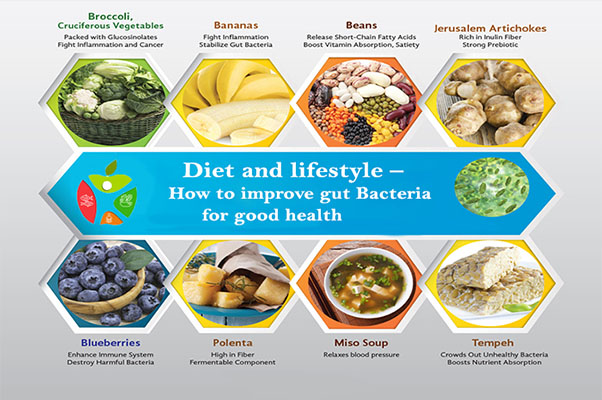Diet and lifestyle – How to improve gut Bacteria for good health
There is increasing evidence that the type and composition of bacteria that are there in our gut have an impact on our health. Research suggests certain bacteria in our gut can prevent and treat many common diseases. This means, certain types of bacteria in our gut have a positive effect on health and help to keep us healthy. Diet, particularly macronutrients, has a major role in shaping the kind and composition of the gut microbiota. Both, long and short term changes in the diet can influence the microbial profile and consequently have a bearing on the immune system.
Thousands of different microbes may inhabit the gut of human populations collectively and growing evidence shows that imbalances in gut microbial populations can be associated with disease. Certain bacteria have been seen to have a positive effect on the health and well being. Some of these have been identified as Lactobacillus, Bifidobacterium and Bacteroides.
Gut microbes are capable of producing a vast range of products which have an influence of the person’s health. The dietary strategies that support to maintain the balance, nourish and support the gut bacteria are inclusion of certain types of foods in our daily diet. These are:
- Fiber
- Pro-biotic foods
- Pre-biotic foods and
- Fermented foods
These foods either provide live bacteria or act as substrates for the gut bacteria, which have a beneficial effect on health. The maintenance of a diverse and thriving population of beneficial gut bacteria helps to keep harmful bacteria at bay by competing for nutrients and sites of colonization.
Dietary means, particularly the use of a range of fibers, may be the best way of maintaining a healthy gut microbiota population. Dietary fiber and non-digestible oligosaccharides are the main growth substrates of gut microorganisms, these change the composition and activity of the intestinal microbiota with the prospect to promote the health of the host. Also, strategies such as ingestion of live beneficial bacteria (probiotics) may also assist in maintaining health.
Fiber rich foods that promote the good bacteria in the colon are, all fruits and vegetables such as beans, peas, berries of all kind, apple, banana, green leafy vegetables and also whole grains and legumes.
Although all prebiotics are fiber, not all fiber is prebiotic. So foods that are high in fiber are mostly prebiotic for example, garlic, onion, wheat bran, raw banana, flaxseeds, oats and sprouts. These help the probiotic foods work more efficiently.
Best examples of pro biotic foods (foods that are rich in live bacteria) are yogurt (curd) and products made from it like buttermilk, pickles (especially made in foods own juice and salt) like lemon pickle, Kanji (red carrots fermented in salt and water) and Kafir (fermented milk drink). Pickles made in vinegar do not contain live bacteria.
Fermented foods are the foods which are preserved or produced by the action of microorganisms. Bread, buttermilk, cheese, pickles, certain indian dishes like idli, appam, dhokla, kefir, certain fermented sauces, pickles, soy sauce and tabasco, ketchup, etc.
Along with including the foods that are rich in pro and prebiotics, it is also important to bring changes in the lifestyle, such as judicious use of antibiotics, not including too many foods rich in simple sugars in daily diet, avoiding artificial sweeteners, not drinking highly chlorinated water and including foods rich in fiber and that have been fermented or have probiotic benefits, regularly in their daily diets.
According to scientists, “Anything that can feed good bacteria and keep them plentiful is good for overall health. When the gut is happy, you are happy.”
Free Consultation with : Best Nutritionist in Delhi

